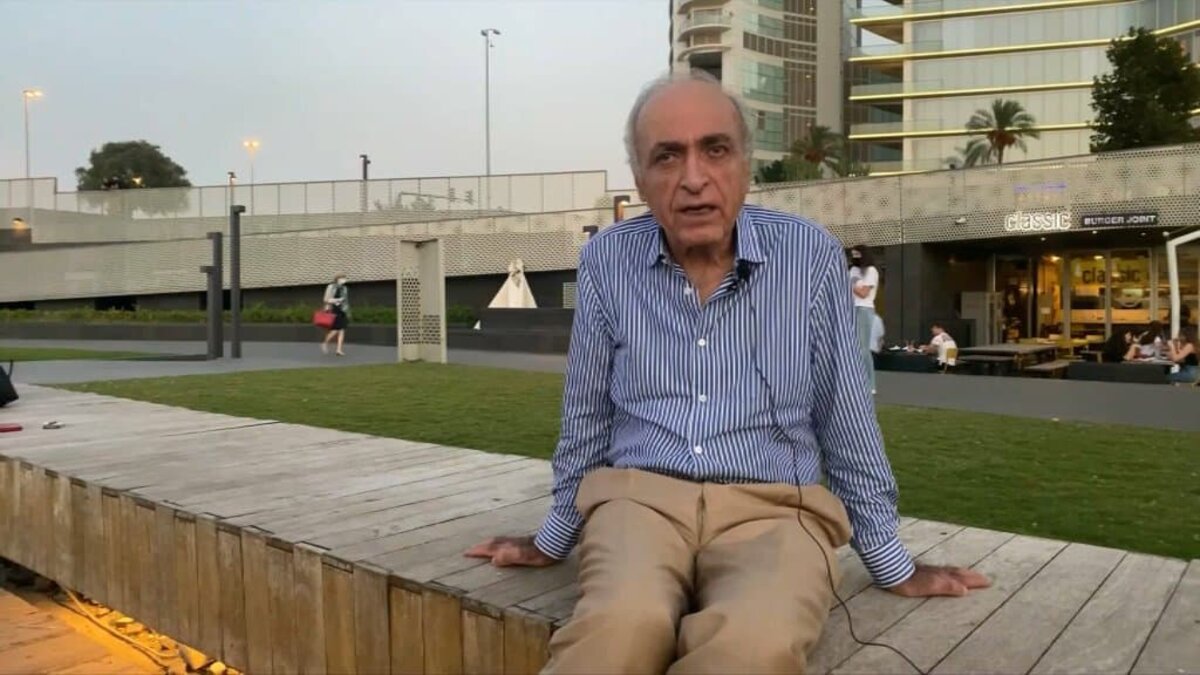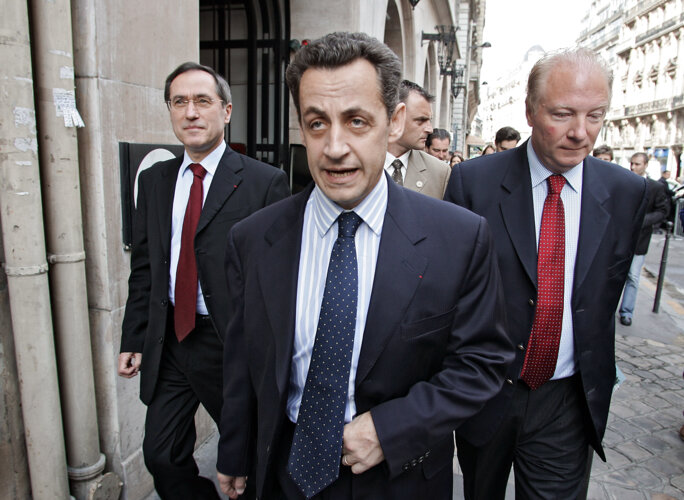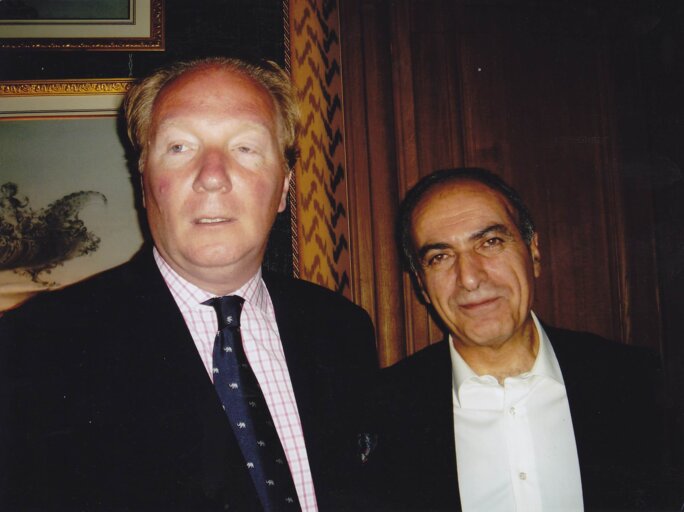Sitting on a bench looking out over the sea near Beirut, his arms pressed close to his sides, the ruined businessman Ziad Takieddine, who is on the run after being jailed by a French court in the Karachi affair, has made a retraction. In a 30-second interview on news channel BFM-TV – probably the shortest the station has ever done - the middleman announced that the French justice system had made him say the exact opposite of what he was thinking or saying during the nearly eight years of the affair that involves claims of Libyan funding of Nicolas Sarkozy's 2007 presidential campaign.
“I confirm that it's not true,” he starts, without the viewer hearing what the question was. “Mr Sarkozy did not have Libyan financing for the presidential campaign, neither could Mr [Muammar] Gaddafi have done it because he never did it.”

Enlargement : Illustration 1

In the latest issue of Paris Match magazine, which is owned by the Lagardère group where Nicolas Sarkozy sits on the supervisory board, Takieddine also said that he had never delivered Libyan money to offices at the Ministry of the Interior when Sarkozy was minister there. That is what he had previously admitted to doing, and had incriminated himself in doing so, first to Mediapart, then to the agency Premières Lignes, then to detectives and finally to judges investigating the affair.
The online publication of the BFM-TV video on Wednesday November 11th – timed to coincide with the publication of Paris Match the following day – was immediately followed by a triumphant press statement from Nicolas Sarkozy greeting Takieddine's new declarations.
Yet unfortunately for the former president and those close to him this tactical U-turn cannot remove the evidence that has been accumulated by detectives and judges in the Libyan affair. In particular these include payments made in 2006 by the Libyan state to one of Takieddine's offshore bank accounts, of which 440,000 euros ended up in the Bahamas account of Thierry Gaubert, who was close to Nicolas Sarkozy. This money was then withdrawn as cash in France. This is an embarrassing issue for Nicolas Sarkozy who has denied his closeness to Gaubert, despite the evidence to the contrary gathered during the investigation.
The former president would also prefer to forget that the investigating judges Aude Buresi and Marc Sommerer have gathered a great deal of other material evidence of his compromising behaviour towards Gaddafi's regime. These include:
- In Tripoli in September and December 2005 his two close lieutenants, Claude Guéant (director of staff) and Brice Hortefeux (his junior minister) secretly met the man who ordered the Gaubert payment, Abdullah Senussi. Senussi, who was Gaddafi's brother-in-law and the head of Libya's military secret services, had been convicted in absentia and was actively being sought by the French legal authorities for having organised the 1989 bombing of a French UTA airline DC10 passenger plane over Niger, in which 170 people lost their lives.
- His team, including most prominently his own lawyer Thierry Herzog and Claude Guéant, is suspected of having spent a lot of energy in getting the French arrest warrant against Senussi lifted, as shown by many documents provided to the investigation.
- Large sums of undeclared cash were flowing around his presidential campaign in 2007.
- Another Libyan financing channel has been identified by the investigation - supported by bank evidence - via another middleman, Alexandre Djouhri, and another prominent Libyan figure Bashir Saleh. Saleh was head of Gaddafi’s 40-billion dollar Libyan African Portfolio (LAP) sovereign wealth investment fund and his former chief of staff. Claude Guéant also received money via this channel.
- According to the judicial investigation, between 2005 and 2009, as minister of the interior and then French president, Nicolas Sarkozy granted important diplomatic, legal and economic benefits to the Libyan regime.
The (partial) retraction by Ziad Takieddine, who continues to accuse Claude Guéant of having received the Libyan money, comes exactly a month to the day after judges again placed Nicolas Sarkozy under formal investigation over the Libyan affair, this time for “criminal conspiracy”. In March 2018 Nicolas Sarkozy was put under formal investigation under three different headings - for “illicit funding of an electoral campaign”, “receiving and embezzling public funds” and “passive corruption”. The decision by judges to place him under investigation for these last three offences had been backed by the prosecution and subsequently upheld by different judges at the court of appeal in Paris.

Enlargement : Illustration 2

During four days of questioning by the investigating judges in October this year, Nicolas Sarkozy was boxed in by the evidence accumulated by the investigation and had to lay responsibility for any wrongdoing on his two long-standing right-hand men, Claude Guéant and Brice Hortefeux. He was also withering about Takieddine, describing him variously as a “madman” and a “manipulator” and someone who was “clever and unscrupulous”.
Now, a month later, Takiddine's words are being given credence again after his partial retraction. “The truth is finally coming out,” the former president said in his press statement after the middleman's interview was broadcast . “The main accuser acknowledges his lies. He never gave me money, there was never any illegal financing of my 2007 campaign.”
Already Nicolas Sarkozy is preparing to “file a request to remove [me] from formal investigation”, to “start proceedings for slander” against Takieddine and to ask “that the judicial authorities get to the bottom of the serious accusations made as to the impartiality of certain judges”. In a press release issued on Thursday November 12th Sarkozy's political party Les Républicains paved the way for him by attacking the judicial “hounding” of the ex-head-of-state as well as the “bias of an investigation” which they claimed had “weakened democracy”.
In the short BFM-TV video Ziad Takieddine accused one of the judges initially involved in the investigation, Serge Tournaire, who is now in another post at Nanterre west of Paris, of having deliberately mis-transcribed his comments. It was as if the middleman had never said these remarks publicly before – and to many media – and then to the police before confirming them to Judge Tournaire in a statement that was duly signed in the presence of his lawyer.
“I say this loud and clear, Judge Tournaire really wanted to spin it his way and to make me say comments which are completely contrary to the comments I made … there was no financing of Sarkozy's presidential campaign,” claimed the middleman. His retraction fits perfectly with the former president's new legal defence policy: put the responsibility on Guéant, downplay Gaubert, attack the judges - and exonerate Sarkozy.
In October 2019 during the Karachi affair trial – which also involved the secret funding of French political life via foreign countries – Takieddine had already retracted his statement in relation to that case. Here, too, he insisted that his statement about his cash payments to the election campaign run by Édouard Balladur (of whom Sarkozy was a key supporter) had been forced out of him by a judge, in this case Renaud Van Ruymbeke. “The transcription [editor's note, of his comments] is completely wrong. In any case, the interpretation is completely wrong,” he insisted during the trial in Paris, in a U-turn that scarcely helped his legal cause.
The middleman is today on the run. He was found guilty in that trial of having orchestrated – alongside two close allies of Nicolas Sarkozy, Nicolas Bazire and Thierry Gaubert – the misappropriation of 160 millions euros in the context of arms sales to Pakistan and Saudi Arabia. In June this year Ziad Takieddine was jailed for five years for his involvement in the affair. He has appealed. Absent for the verdict, during which an arrest warrant was issued against him, Takieddine has not been seen in France since. He is now in Lebanon, where he is from originally, a country which does not extradite its own citizens.
The 'truth' says Sarkozy; Guéant insists it's a 'tall tale'
Takieddine's retraction in the Karachi trial led to him being spared by his co-accused at the hearing, in particular by Nicolas Bazire, who was a witness at Nicolas Sarkozy's wedding to Carla Bruni in 2008. But it is still hard to see what has led him to make these new declarations in the Libyan affair.
A month ago, during his questioning by judges, Nicolas Sarkozy had been confronted for the first time with the evidence relating to Takieddine, which establishes the key role occupied by the middleman in the preparations for the Libyan affair. The evidence also shows he was very close to Claude Guéant and Brice Hortefeux, who were at the time working under Nicolas Sarkozy's direct authority.

Enlargement : Illustration 3

The former French president personally admits to just two meetings in total with the middleman and says he has “never seen” him since 2003. In that year the intermediary was spotted in Sarkozy's office, accompanied by Brice Hortefeux, calling a Saudi prince to persuade him to sign a big border security contract. “Personally I never liked Ziad Takieddine who I always found conceited,” said the former president.
Sarkozy told the judges he had “made a lot of enquiries” about Takieddine to find out why the latter “was against me”. He said: “It seems to me that there's an interesting date, that's the date on which he had his serious accident on Mustique Island, in 2004, when [editor's note, junior minister] Jean-Francois Copé helped him so much,” said the former president (read details of the accident here). “Before that he was receptive to a certain degree of rationality, from that time on he was all over the place. This man had two disruptions in his life; his head accident and the break-up with his wife. I saw him on the television with [presenter Laurent] Ruquier, he seemed mad.”
“I never took to him, I never let him get close … you can look at the case from all angles, there's nothing with me,” said Sarkozy. “Yes, the file shows that he knew Brice Hortefeux and Thierry Gaubert. Ziad Takiddine increased his contacts around me because he was trying to harm me. But he didn't manage to,” he said.
Two of Takieddine's drivers have given statements about the middleman's many meetings with Brice Hortefeux – who came to his home dozens of time, according to the witnesses – as well as with Claude Guéant. The middleman met the latter two or three times a week, at an hotel bar near the Ministry of the Interior then at home.
“I never asked Claude Guéant to see Ziad Takieddine, never, neither verbally nor in writing,” Sarkozy told the judges. “He never reported back to me on meetings, I don’t know how nor how many, with Ziad Takieddine.”
“If what Ziad Takieddine had to do was so important, and so sensitive, why wouldn’t I see him, why would I not receive him [for a meeting]?” continued Sarkozy. “If it concerned a corruption pact, would I sub-contract? What’s the logic? It’s sensitive, it’s funding, and I never see him?”
This was exactly one of the judges' accusations: that all that Guéant and Hortefeux did in Libya, hand in hand with Takieddine, was done on behalf of and under the organisational and political authority of Nicolas Sarkozy.

Enlargement : Illustration 4

The theory developed by Nicolas Sarkozy during his questioning at the start of October is that the middleman had himself pocketed money given by the Libyans. “The one thing that is certain is that he took Libyan money,” said the former president. “... Ziad Takiddine was afraid about the money, he had to tell the Libyans that it was for me and afterwards he constructed this tall story about cash. I wouldn't bet my life that no one told the Libyans that there was money for me. Alas!”
The ex-head-of-state went on: “In your file and after your investigations you have flagged up these 7 million euros plus 1.5 million in cash. So you have a sum of 8.5 million euros which comes from Libya without any challenge and ends up in an account or Ziad Takieddine's suitcase. Conversely, you have not got a centime marked against me, just some declarations from some cornered or misled Libyans who have listened to Ziad Takieddine.”
In the long version of his interview published in Paris Match on Thursday November 12th, Ziad Takieddine said that he had told the judges “what they wanted to hear” out of “fear”, not of the Libyans but out of fear of being placed under investigation and “not to be able to get out of it”. The middleman said: “I understood that all that interested them was to win the medal: destroy Sarkozy! And that they were going to kill me slowly to reach their objective.”
If one believes Nicolas Sarkozy, Ziad Takieddine now acknowledges “his lies” and is telling “the truth”. He is retracting the story that he told Mediapart and the agency Première Lignes in 2016 of successive deliveries of three suitcases of Libyan money to the Ministry of the Interior, a total of five million euros in all. This story had been confirmed with the middleman several days later by detectives investigating the Libyan funding affair. Takieddine had said that he had brought back these sums from Libya by plane at the request of Abdullah Senussi, and that he had twice handed money over to Claude Guéant in 2006 and on a third occasion to Nicolas Sarkozy in January 2007.
Today he is saying something very different to Paris Match. “Nicolas Sarkozy did not receive the 5 million euros from me,” said Takieddine. “There was never money for his campaign. All that I did was give 5 million in cash to Claude Guéant, at my place, at the house, in accordance with the terms of a security agreement between France and Libya. That was in 2005. A contract to secure IT systems and transmissions provided for Libyan personnel to train in France with a changeover every month. That all cost 5 million dollars, and it was Libya that was paying.”
“We have thus gone from a delivery in 2007 to a payment in 2005, and euros have become dollars,” noted the person who did the interview. The story also changed from several deliveries made to the ministry to just one made at his home. But Guéant remained the recipient, unlike Sarkozy.
When Mediapart contacted him Claude Guéant said Takiddine's latest story was a “tall tale” based on “pure fantasy”, even though Sarkozy claimed that the middleman's words now were the “truth”.
In reality, from his very first account Ziad Takieddine had not directly linked the delivery of these cash sums to Nicolas Sarkozy's presidential campaign, and he had already explained that these 5 million were accounted for by collaborative agreements between the countries' services. The middleman is now talking about a “contract to secure IT systems”. Yet while there was indeed a contract of this nature negotiated with Libya for the company 12e-Amesys, that was in 2006 and it was only signed in March 2007.
It is therefore quite difficult to identify a “truth” in the middleman's new version, which has just one visible objective, and that is to serve the legal interests of Nicolas Sarkozy – and only Nicolas Sarkozy.

On the other hand, it is already clear that Takieddine has told some falsehoods to Paris Match. Trying to justify the payment of 440,000 euros from funds received from Libya into the offshore account of Sarkozy ally Thierry Gaubert in February 2006, the intermediary speaks of his wish to “help with the construction of a swimming pool at his [editor's note, Gaubert's] villa in Colombia”.
Unfortunately, when he was questioned by detectives over the Karachi affair in 2011 Thierry Gaubert had himself said in a statement that he had had a “house and swimming pool” built in Colombia for 300,000 dollars. And that had been in 2001 and 2002, four years before the Libyan money arrived. “That's where the personal conviction of the judges in leading. The payment for a swimming pool becomes financing the Republic,” Takieddine declared, incorrectly, to Paris Match.
“But who will trust his word again?” concludes the Paris Match journalist who carried out the interview.
On Thursday November 12th France's financial crimes prosecution unit the Parquet National Financier (PNF) issued a statement rejecting Takieddine's claims about him being forced into making statements and pointing out that he had been given ample time to read his formal statements before signing them.
The unit's prosecutor Jean François Bohnert also pointed out that individuals had been placed under investigation in the case because of “serious and concurring evidence” which was not just restricted to the evidence of one person.
And he said that Takiddine's allegations about Judge Serge Touranire were “without any foundation”. (See the full statement in the boîte noire box below).
-------------------------
If you have information of public interest you would like to pass on to Mediapart for investigation you can contact us at this email address: enquete@mediapart.fr. If you wish to send us documents for our scrutiny via our highly secure platform please go to https://www.frenchleaks.fr/ which is presented in both English and French.
-------------------------
- The French version of this article can be found here.
English version by Michael Streeter


